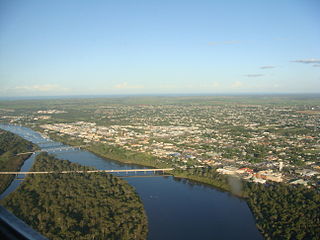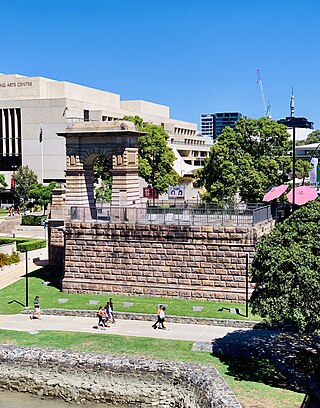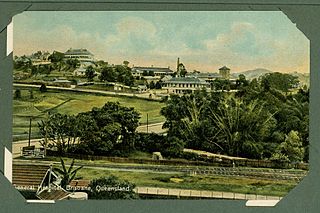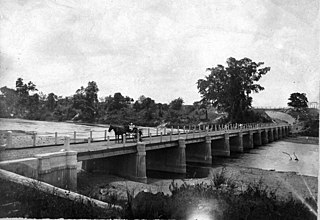
Bundaberg is a city in the Bundaberg Region, Queensland, Australia, and is the tenth largest city in the state. Bundaberg's regional area has a population of 70,921, and is a major centre of the Wide Bay–Burnett geographical region. The Bundaberg central business district is situated along the southern bank of the Burnett River, about 20 km (12 mi) from its mouth at Burnett Heads, and flows into the Coral Sea. The city is sited on a rich coastal plain, supporting one of the nation's most productive agricultural regions. The area of Bundaberg is the home of the Taribelang-Bunda peoples. Popular nicknames for Bundaberg include "Bundy" and "Rum city". The demonym of Bundaberg is Bundabergian.

The Victoria Bridge is a bus and pedestrian bridge over the Brisbane River. The current bridge, opened in 1969, is the third permanent crossing erected at this location. Since 24 January 2021, the bridge has been closed to general traffic, and now carries buses, pedestrians and cyclists only.

Albert Bridge is a heritage-listed railway bridge of steel truss design crossing the Brisbane River between Indooroopilly and Chelmer in the City of Brisbane, Queensland, Australia. It was designed by Henry Charles Stanley and built from 1894 to 1895 by John McCormick & Son as a replacement for an earlier bridge lost to flooding in 1893. Both bridges were named in honour of the Prince of Wales, Prince Albert. It was added to the Queensland Heritage Register on 21 October 1992.

Childers is a rural town and locality in the Bundaberg Region, Queensland, Australia. In the 2016 census, the locality of Childers had a population of 1,584 people.

Lamington Bridge is a heritage-listed road bridge over the Mary River from Gympie Road, Tinana to Ferry Street, Maryborough, both in the Fraser Coast Region, Queensland, Australia. It was designed by Alfred Barton Brady and built from c. 1896 to 1970 by McArdle & Thompson. It was added to the Queensland Heritage Register on 21 October 1992.

Bundaberg Central is the central suburb and central business district of Bundaberg in the Bundaberg Region, Queensland, Australia. In the 2021 census, Bundaberg Central had a population of 162 people.
Thomas Pye was an Australian architect. He worked for over 33 years in the Public Works Department in Queensland. Pye contributed significantly to major buildings including the completion of the Public Offices and Rockhampton Customs House, as well as the design for the Lands and Survey Offices. He was responsible for the heightened expectations which produced the best public buildings yet seen in Queensland.
The Queensland Government Architect is a position within the public service of Queensland, Australia with responsibility for the design of government buildings in Queensland. It was formerly known as the Queensland Colonial Architect. The position is located within the Queensland Department of Housing and Public Works.

St Mary's Roman Catholic Church is a heritage-listed church at 271–275 Adelaide Street, Maryborough, Fraser Coast Region, Queensland, Australia, on land donated to the Church by Maryborough pioneer James Cleary. It was initially designed by Charles Tiffin with later additions and alterations by Francis Drummond Greville Stanley and POE Hawkes. The initial construction was from 1869 to 1872 by G Smith and J Thomas. It was added to the Queensland Heritage Register on 21 October 1992.

John H. Buckeridge (1857–1934) was an English-born Australian architect, who built about sixty churches in Queensland and is also remembered for remodelling the interior of the Macquarie era church of St James', King Street, Sydney.

Victoria Bridge Abutment is a heritage-listed road bridge remnant at 74 Stanley Street, South Brisbane, City of Brisbane, Queensland, Australia. It was designed by Alfred Barton Brady and built in 1896 by Arthur Midson. It was added to the Queensland Heritage Register on 21 August 1992.

Brisbane General Hospital Precinct is a heritage-listed hospital precinct at 40 Bowen Bridge Road, Herston, City of Brisbane, Queensland, Australia. It was built from 1875 to 1941. It includes six historic buildings associated with the Royal Brisbane and Women's Hospital and the former Royal Children's Hospital, as well as aspects of their grounds and landscaping. It was added to the Queensland Heritage Register on 28 March 2003. A number of buildings in the precinct, in particular the Lady Lamington Nurses Home, will be redeveloped as part of the Herston Quarter development.

Harlin Rail Bridge is a heritage-listed railway bridge over Ivory Creek at Harlin, Somerset Region, Queensland, Australia. It was designed by Queensland Railways and built in 1910 by Queensland Railways. It was added to the Queensland Heritage Register on 27 November 2008. It was destroyed in 2013 as a consequence of flooding associated with Cyclone Oswald.
Frederic Herbert (Herb) Faircloth (1870–1925) was an architect in Bundaberg, Queensland, Australia. Many of his buildings are now heritage-listed.

Burnett Bridge is a heritage-listed road bridge crossing the Burnett River from Quay Street, Bundaberg Central to Perry Street, Bundaberg North in Bundaberg, Bundaberg Region, Queensland, Australia. It was designed by Alfred Barton Brady and built in 1900. It is also known as Burnett River Traffic Bridge. It was added to the Queensland Heritage Register on 21 October 1992.

East Bundaberg Water Tower is a heritage-listed water tower at 17 Sussex Street, Bundaberg East, Bundaberg Region, Queensland, Australia. The tower is the only circular brick water-tower in Queensland and was designed by James Baillie Henderson and built from 1901 to 1902. It was added to the Queensland Heritage Register on 21 October 1992.

Kennedy Bridge is a heritage-listed road bridge on Bourbong Street crossing Bundaberg Creek from Bundaberg Central to Bundaberg East in Bundaberg, Bundaberg Region, Queensland, Australia. It was designed by Alfred Barton Brady and built in 1899. It is also known as Saltwater Creek Road Bridge. It was added to the Queensland Heritage Register on 21 October 1992.

Gairloch Bridge is a heritage-listed road bridge over the Herbert River at Old Bruce Highway, Ingham, Shire of Hinchinbrook, Queensland, Australia. It was designed by Alfred Barton Brady and built from 1890 to 1891 by James Graham. It was added to the Queensland Heritage Register on 17 July 2008.

Deep Creek Railway Bridge is also known as Chowey Bridge. It is a heritage-listed railway bridge on the Mungar-Monto railway line in Didcot, North Burnett Region, Queensland, Australia. It was built in 1905 by day labour. It was added to the Queensland Heritage Register on 21 October 1992.

William Pagan (1849–1924) was a railway engineer in Queensland, Australia. He designed many railway bridges, some of which are now heritage-listed.

















